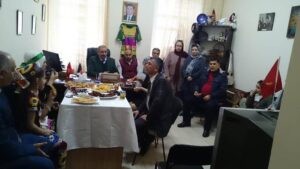KABUL (SW) – In a resounding call, media-related officials and journalists once again urge the swift approval of the Mass Media law.
Officials at the Afghan Journalists Safety Committee (AJSC) say that while the situation for media operations and access to information has somewhat improved this year, but the de-facto government authorities have not taken serious and practical steps to address journalists’ challenges.
Abdul Qadim Wiyar, the committee’s acting head, stated that journalists in some provinces still face information gaps. He added, “Information is not shared with journalists, and in most cases, news remains unpublished or is inadequately covered. Our demand is for the fate of the Mass Media law to be clarified, and mechanisms to support the media to be established.”
Some journalists and officials of some media outlets called for the adoption of a Mass Media Law and the right to access information. They argued that the absence of a media law and the right to access information has posed challenges for them.
Zabihullah Sadat, the head of a visual media outlet, emphasized that building trust and dialogue are effective ways to enhance cooperation between the Islamic Emirate officials and the media. He added, “Trust-building is necessary but practical steps have not yet been taken to address the challenges. Some positive changes have occurred; officials did not give us the opportunity to talk to them before. Now we see willingness, a trust environment has been established, and more work needs to be done in this regard.”
Farahnaz, a journalist at a visual media outlet, said that the lack of access to accurate and timely information has made her journalistic work difficult. She added, “We do not have access to accurate information. They answer questions, but what we want does not reach us; they all talk in one direction. Various dimensions remain incomplete in the reports.”
Sediqa, another journalist, noted that the lack of permission for women journalists to participate in some press conferences remains a significant challenge for their work. “Unfortunately, the conditions for the media are not as good as expected. In some conferences, permission is not granted, limiting job opportunities for us. Better freedom should be granted to us so that we can pursue our work within a structured framework,” she said.
However, according to statistics from the AJSC, the presence of women in the media has increased by 17% compared to last year, while men’s presence has increased by 10 percent.
This comes as the Islamic Emirate has repeatedly stated its commitment to freedom of expression within the framework of Islamic values, national interests, and cultural values of the country.






